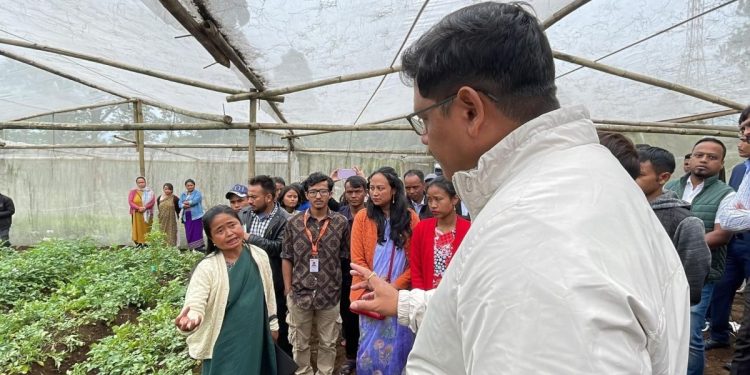#MeghalayaAgriculture #TissueCultureTechnology #ARC #CropProduction #SustainableFarming #FoodSecurity
Shri. Conrad K Sangma, the Hon’ble Chief Minister of Meghalaya, recently visited a tissue culture laboratory and witnessed the success of apical rooted cutting (ARC) techniques in the fields of farmers in East Khasi district. This article explores the development and consequences of implementing ARC and tissue culture technologies in Meghalaya’s agricultural sector.
In September 2021, the International Potato Center (CIP) collaborated with the Meghalaya Basin Management Agency and the International Fund for Agricultural Development (IFAD) to introduce apical rooted cutting (ARC) technology in Meghalaya. This innovative technique allows for the rapid multiplication of plantlets in a controlled environment.
Within a short span of less than two years, Meghalaya has made significant progress in adopting tissue culture and ARC methods. The state now boasts two fully operational tissue culture laboratories equipped with trained personnel, capable of producing over 2 lakhs (200,000) plantlets annually.
The implementation of polyhouses and net houses in various locations has further facilitated the production of ARCs and G0 seed production. These controlled environments provide optimal conditions for plant growth and development, resulting in healthier and higher-yielding crops.
The introduction of tissue culture and ARC technology has brought about a revolution in Meghalaya’s agricultural sector. Farmers now have access to high-quality plantlets that exhibit better resistance to diseases, pests, and environmental stress. This translates to improved crop yields and enhanced food security in the region.
Additionally, the adoption of these modern techniques has opened up new avenues for economic growth. Meghalaya is now able to sell ARCs to neighboring states, such as Assam, meeting the demand for superior quality planting material. This not only generates income for the state but also promotes regional collaboration and knowledge sharing in the field of agriculture.
Furthermore, the successful implementation of tissue culture and ARC methods serves as a model for other states and regions to replicate. The advancements made in Meghalaya highlight the potential of these technologies in addressing the challenges faced by the agricultural sector, such as limited land availability and decreasing arable areas.
Meghalaya’s journey towards agricultural transformation through tissue culture and apical rooted cuttings is a testament to the state’s commitment to sustainable and innovative farming practices. With increased production of high-quality plantlets and the ability to supply neighboring states, Meghalaya is poised to become a significant contributor to the region’s agricultural development.







